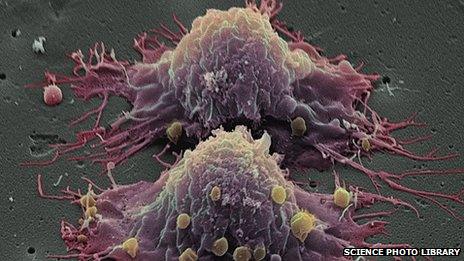Cancer model research helps pinpoint risk, says Cardiff Uni scientist
- Published

Bowel cancer kills about 16,000 people a year in the UK
A new DNA model for bowel and womb cancer will help diagnose those at high risk, it is claimed.
It follows work by an international group of scientists, including one from Cardiff University.
They have been researching how an inherited condition called Lynch Syndrome can increase the risk of bowel, womb and other cancers.
The new model of previously unhelpful DNA data can now be put to use.
"As a result of this work, doctors will now be able to say much more confidently whether those patients have Lynch Syndrome, and therefore whether they are at a higher risk of cancer," said Dr Ian Frayling from Cardiff University's Institute of Medical Genetics.
He is one of the members of the International Society for Gastrointestinal Hereditary Tumours (InSiGHT) which organised the research.
"What we have been able to do is effectively refine genetic information in the InSiGHT database and provide a more accurate answer of the risk of getting cancer," he said.
"This will help to save more lives, because by giving a definite answer to more patients, they will be able to access the specialist screening that they need."
'Genetic limbo'
The findings have been published in the journal Nature Genetics.
In the UK alone, about 16,000 people die from bowel cancer every year, and womb cancer affects about 2,000 women making it the commonest form of gynaecological cancer.
Wales also has the highest rates for womb cancer in the UK.
In all those cancer cases, it is estimated that some 5% develop the diseases as a result of having Lynch Syndrome.
Patients who currently have genetic testing for Lynch Syndrome are often given an inconclusive result which leaves them unsure of whether they face a high risk of cancer.
"It will also save NHS resources and be safer because we will be able to reassure people that they are not at risk and so don't need the extra screening," added Dr Frayling.
"As a result of this, colleagues and the families they care for all over the UK are now benefiting, and we are working on incorporating this into the UK guidelines on testing for Lynch Syndrome."
- Published9 December 2013
- Published15 November 2013
- Published7 November 2013
- Published28 September 2013